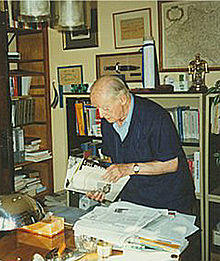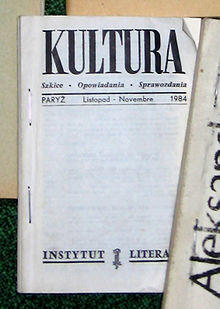Jerzy Giedroyć | |
|---|---|
 Jerzy Giedroyć (Maisons-Laffitte, 1997) | |
| Born | Jerzy Władysław Giedroyć 27 July 1906 Minsk, Russian Empire |
| Died | 14 September 2000 (aged 94) Maisons-Laffitte, France |
| Resting place | Le Mesnil-le-Roi |
| Language | Polish |
| Nationality | Polish |
| Alma mater | University of Warsaw |
| Genre | Publicist |
| Subject | Politics and Literature |
| Literary movement | Independence |
| Notable works | Editor Kultura |
Jerzy Władysław Giedroyc (Polish pronunciation: [ˈjɛʐɨ ˈɡʲɛdrɔjt͡s]; 27 July 1906 – 14 September 2000) was a Polish writer and political activist and for many years editor of the highly influential Paris-based periodical, Kultura.
Life and career
Giedroyć was born into a Polish-Lithuanian noble family, with the title of kniaź, prince. His schooling in Moscow was interrupted by the October Revolution, when he returned home to Minsk. During the Polish–Soviet War of 1919–1921 his family left Minsk for Warsaw, where he finished the Jan Zamoyski gymnasium in 1924. He went on to study law and Ukrainian history and literature at the University of Warsaw.[1] As a journalist and civil servant in interwar Poland, he maintained contacts with leading Ukrainians and urged the Roman Catholic Church to improve relations with the Greek Catholic Church to which most Ukrainians belonged, insisting that Poland's success as a national state depended on satisfying the aspirations of minorities so that minority nationalists would not have convincing arguments against Polish statehood. He thus took the side of Józef Piłsudski as against the National Democrats.[2] In 1930 he took over as editor of the weekly "Dzień Akademicki" (Academic Day) which he soon transformed into the biweekly "Bunt Młodych", renaming it Polityka in 1937.

During World War II he served under General Władysław Anders in the Polish Army and kept up friendly contacts with representatives of other nationalities. After the war he moved to Paris, where he published and edited a leading Polish-émigré literary-political journal, Kultura (1947–2000), which promoted a peaceful settlement of Poland's eastern borders, and accepted the results of the Molotov-Ribbentrop Pact and the Yalta Conference, the (Giedroyc-Mieroszewski doctrine), even though many Poles regarded these as betrayals of Poland. This helped to lay the groundwork for Poland's successful eastern policy after the fall of communism.[3] His closest collaborator was Juliusz Mieroszewski, who provided the theoretical justification for Polish recognition of the borders with Ukraine, Belarus, and Lithuania (whose future independence he predicted long before it came about).[4]
He died in Maisons-Laffitte, Yvelines, Île-de-France, France.[5]
In 2006 the Polish Sejm declared the year 2006 as the "Year of Jerzy Giedroyć."
See also
- Giedroyc Doctrine
- Jerzy Giedroyc Literary Award
References
- ^ Timothy Snyder, The Reconstruction of Nations: Poland, Ukraine, Lithuania, Belarus, 1569-1999 (Yale University Press, 2003: ISBN 030010586X), p. 218.
- ^ Snyder, The Reconstruction of Nations, pp. 218-19.
- ^ Snyder, The Reconstruction of Nations, pp. 217-20.
- ^ Snyder, The Reconstruction of Nations, pp. 220-22.
- ^ Polish Culture Jerzy Giedroyc page
External links
- Correspondences between Giedroyc and Melchior Wańkowicz Sarmatian Review September 1999